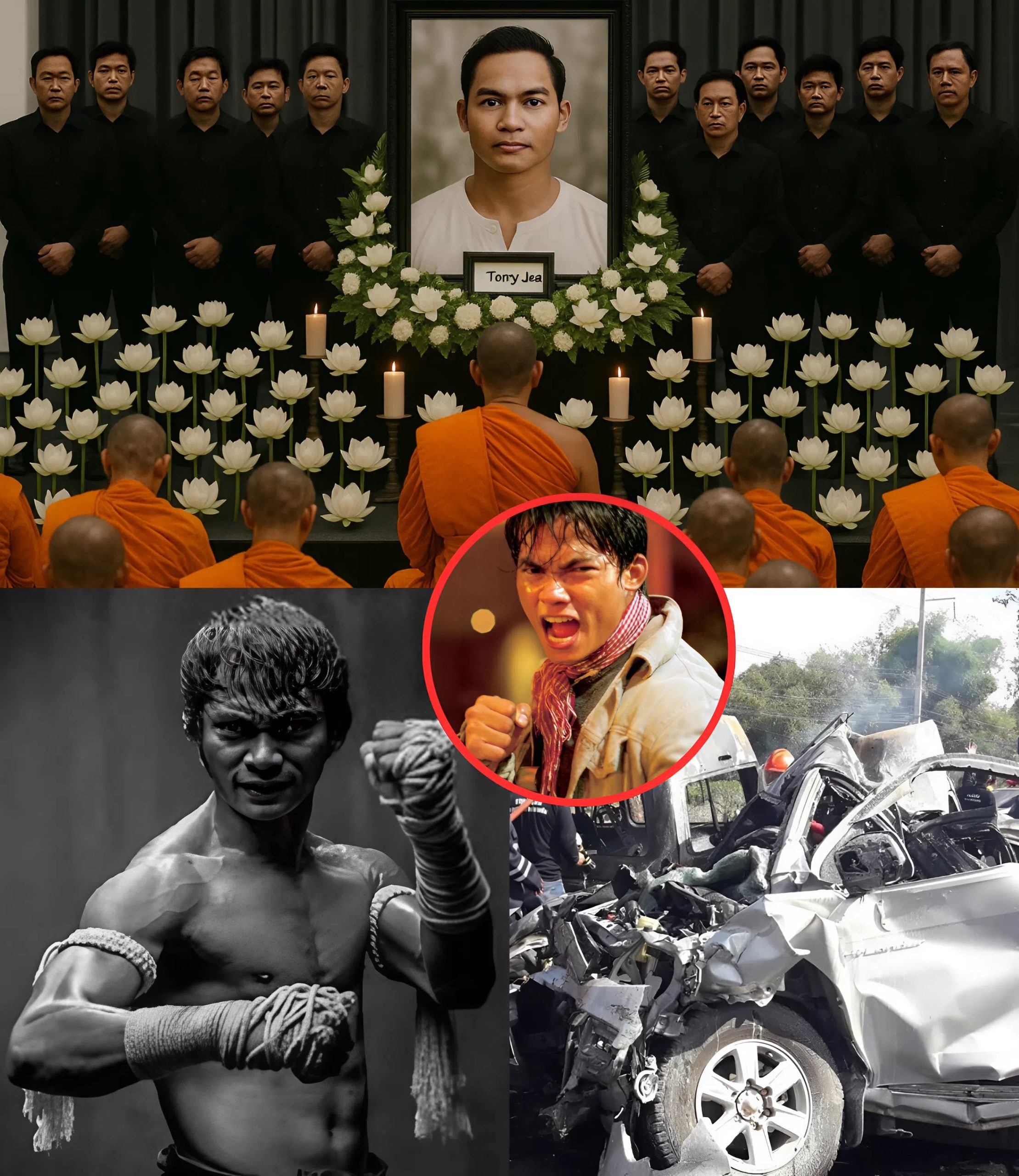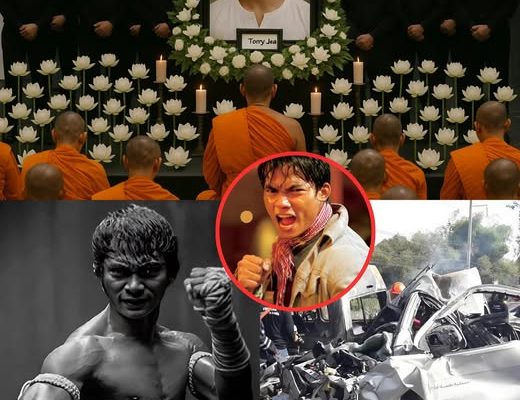Bangkok, Thailand — Shock, grief, and disbelief are reverberating across Thailand and the global film industry this afternoon, as news spreads of a fatal road accident in central Bangkok that has claimed the life of one of the country’s most beloved cultural figures: Tony Jaa. Known globally as the face of modern Muay Thai and celebrated for his electrifying action roles, Jaa’s untimely death is being described as nothing less than the end of an era.
According to police reports, the tragic accident occurred barely thirty minutes ago on one of Bangkok’s busiest expressways during heavy afternoon rain. Multiple vehicles collided, resulting in a chain-reaction crash that left a passenger van overturned and a delivery truck crushed against the median. Among those caught in the chaos was Tony Jaa, who was returning from a film-related event. Emergency crews worked desperately to save him, but he was pronounced dead shortly after arriving at a nearby hospital.
The announcement of his passing has sent shockwaves not only through Thailand but across the world. Fans, fellow actors, and political leaders are struggling to process the reality that a man who embodied strength, fearlessness, and resilience on screen could be taken so suddenly, in such a fragile, human way.

The Accident That Shook a Nation
Details of the crash are still emerging. Eyewitnesses describe torrential rain reducing visibility to near zero in the minutes before the collision. “Cars were swerving, people were honking, and then suddenly there was this enormous crash,” said one bystander who witnessed the accident from a nearby overpass. “When I realized Tony Jaa was among the victims, my heart broke.”
Bangkok Metropolitan Police have launched an urgent investigation, citing excessive speed and poor weather conditions as possible contributing factors. Forensic teams are currently analyzing CCTV footage and black box data from the vehicles involved. Officials have promised transparency in the probe, knowing the nation’s eyes are fixed on every development.
Meanwhile, the atmosphere around the hospital where Jaa’s passing was confirmed remains tense and emotional. Hundreds of fans have already gathered outside, many in tears, holding posters of Ong-Bak and Tom-Yum-Goong. Some knelt on the ground in silent prayer, while others chanted his name in unison — a poignant reminder of the spiritual bond between Tony Jaa and his homeland.
A Cultural Icon Larger Than Cinema
Tony Jaa’s death is not merely the loss of a film star; it represents a rupture in the cultural fabric of Thailand. He was more than a celebrity — he was a national ambassador of Muay Thai, a living symbol of perseverance, and proof that Thai cinema could compete with Hollywood on its own terms.
:max_bytes(150000):strip_icc()/GettyImages-632972664-592048395f9b58f4c090a21c.jpg)
Born in Surin Province in 1976, Jaa grew up in a humble family of elephant herders. His early fascination with Bruce Lee, Jackie Chan, and Jet Li inspired him to dedicate his life to martial arts. With little formal training and virtually no financial support, he practiced tirelessly in rice fields and forests, teaching himself the acrobatic maneuvers that would later dazzle the world.
By the time Ong-Bak: Muay Thai Warrior was released in 2003, Tony Jaa was a fully formed phenomenon. The film’s raw, no-CGI action sequences stunned audiences. For the first time, the world witnessed Muay Thai in its purest cinematic form — elbows crashing, knees flying, bodies tumbling through fire and glass — all performed without wires or doubles. Jaa’s name became synonymous with authenticity, and his work influenced an entire generation of action filmmakers.
The Man Behind the Legend
What made Tony Jaa different from so many other stars was not just his physical ability but his humility. Friends and colleagues often describe him as soft-spoken, almost shy, despite his fierce on-screen presence. He remained grounded even at the peak of his international fame, often returning to his village to practice meditation at local temples and spend time with his family.
Those who knew him say his character was defined by gratitude. “Tony never forgot where he came from,” recalls director Prachya Pinkaew, who helmed Ong-Bak. “Even when he was working in Hollywood with the biggest names, he still spoke about his parents, his teachers, and his village with reverence. Fame never changed his heart.”
This human side of Tony Jaa makes today’s tragedy even more heartbreaking. He leaves behind his wife, Piyarat, and their two young daughters. For them, the loss is deeply personal, a shattering end to a life defined not by global recognition but by love and fatherhood.

Global Tributes and Collective Mourning
Within minutes of confirmation, tributes poured in from across the globe. Hollywood co-stars like Vin Diesel, Paul Walker’s family, and Michelle Rodriguez expressed their sorrow. Vin Diesel wrote on Instagram: “He was more than a co-star; he was a brother. His spirit was unstoppable, his discipline unmatched. The world lost a true warrior today.”
Martial artists, athletes, and actors across Asia echoed similar sentiments. Jackie Chan’s official account posted: “The martial arts family has lost one of its brightest lights. Tony inspired millions, including me. Rest in peace, my friend.”
In Thailand, cultural institutions have proposed that the government declare a period of mourning. Several Muay Thai training camps announced they would hold special ceremonies in his honor, inviting fighters and students to dedicate their bouts to his memory.
An Irreplaceable Legacy
To analyze Tony Jaa’s legacy is to understand the global impact of authenticity. At a time when Hollywood action films increasingly relied on digital effects, Jaa brought back the visceral thrill of real stunts, reminding audiences of the physical artistry that first made martial arts cinema iconic.
Film critics often note that Ong-Bak did for Muay Thai what Enter the Dragon did for kung fu — transforming a local martial art into a global phenomenon. In many ways, Jaa revived an entire cinematic tradition, inspiring younger talents not only in Thailand but across Asia, Europe, and the Americas.
But beyond the industry, his legacy is deeply tied to cultural pride. For Thailand, Tony Jaa was proof that a rural boy with no privilege could rise to world stardom through discipline, respect, and relentless work. His life story became a narrative of possibility — a modern Thai dream that resonated far beyond the silver screen.

The Pain of Sudden Loss
The cruel irony of his death lies in its ordinariness. Here was a man who had risked life and limb in countless stunts — leaping across skyscrapers, fighting through flaming buildings, diving from rooftops — only to be undone by the random violence of a highway accident. It underscores a universal truth: even our strongest heroes remain mortal.
Psychologists observing the public reaction note that such losses often trigger “collective grief,” where people mourn not just the individual but what they represented. For millions, Tony Jaa represented strength, fearlessness, and resilience. His death forces an emotional confrontation with fragility and impermanence.
What Happens Next
The Thai government has confirmed that Tony Jaa’s body will be taken to his hometown in Surin for religious rites, with a state-level memorial service expected in Bangkok. There are already calls for the establishment of a permanent cultural center or foundation in his name, dedicated to preserving Muay Thai and supporting underprivileged children with dreams as big as his.
In the coming days, film festivals from Cannes to Tokyo are expected to honor him with retrospective screenings. Streaming platforms are preparing to highlight his films, introducing them to a new generation who may never have seen the raw brilliance of Ong-Bak on the big screen.
Final Reflection: The Legend Lives On
The news from Bangkok today is devastating. The world has lost not only an actor but a cultural hero who bridged tradition and modernity, who carried the essence of Thai martial arts onto the world stage with dignity and fire. Yet even in death, Tony Jaa remains larger than life.
Every time a young fighter wraps their hands in a Muay Thai gym, every time an aspiring stunt performer flips through the air without wires, every time a fan replays one of his breathtaking chase sequences, his spirit will be alive.
Tony Jaa’s story is no longer just about the boy who became a star. It is now about the legend who became immortal.



